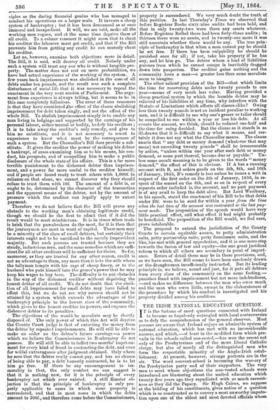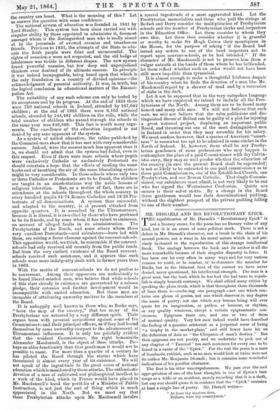THE IRISH NATIONAL EDUCATION QUESTION.
Ir is the fortune of most questions connected with Ireland to become so hopelessly entangled with local controversies as to defy the comprehension of the general observer. Most persons are aware that Ireland enjoys an admirable system of national education, which has met with no inconsiderable success, and which,—at least in the modified form which pre- vails in the schools called non-vested,—has won the assent not only of the Presbyterians and of the more liberal Catholic clergy, but also of nearly all the distinguished men who form the respectable minority of the Anglo-Irish estab- lishment. At present, however, strange portents are in the air. The word convent-school is becoming the war-cry of the Presbyterian party and of their supporters. The very men to meet whose objections the non-vested schools were introduced are blustering about the united education which twenty-five years ago they repudiated with as much earnest- ness as they did the Papacy. Sir Hugh Cairns, we suppose at the bidding of his constituents, gives notice of a question which is so constructed as to convey a most unworthy imputa- tion upon one of the ablest and most devoted officials whom the country can boast. What is the meaning of this ? Let .us answer the question with some confidence.
The national system of education was founded in 1831 by Lord Stanley. This system has been since carried out with singular ability by those appointed to administer it, foremost amongst whom is the distinguished man who is really aimed at in the jeremiads of avowed enemies and treacherous friends. Previous to 1831, the attempts of the State to edu- cate the Irish people were faint and unsuccessful. The rights of conscience were not respected, and the old badge of intolerance was visible in different shapes. The new system found powerful enemies, but few deep and unprejudiced thinkers ever doubted of its ultimate success. In principle it was indeed inexpugnable, being based upon that which is the only foundation in a country of divided opinions—the acknowledgment of parental authority. It was, in truth, but the logical conclusion in educational matters of the Emanci- pation Act.
The suitability of any such scheme can only be tested by its acceptance and by its progress. At the end of 1833 there were 789 national schools in Ireland, attended by 107,042 children ; at the end of 1863 there were 6,163 national schools, attended by 544,492 children on the rolls, while. the total number of children who passed through the schools in the same year was 840,569. This fact is worth many argu- ments. The excellence of the education imparted is not denied by any sane opponent of the system.
As a system of united education, the tables published by the Commissioners show that it has met with very considerable success. Indeed, were the success much less apparent than it is, we should not admit that the system had failed, even in this respect. Even if there were more schools where pupils were exclusively Catholic or exclusively Protestant we should entertain a hope that the effects of reading the same books and of breathing the air of the same liberalizing system might be very considerable. In those schools where only two or three Catholics or Protestants are to be found, the children are taught in an unostentatious way the noble lessons of religious toleration. But, as a matter of fact, there are in attendance at the schools throughout the whole country in every hundred pupils 81.74 Roman Catholics and 18.26 Pro- testants of all denominations. A system thus successful, and adapted to the country, is at present attacked from opposite quarters. It is assaulted by the Ilitramontanes, because it is liberal, it is assaulted by those who have professed to be its friends, and by some whom it has raised to eminence, on account of alleged faults in its administration. The Presbyterians of the North, and some others whom those very excellent Protestants—and calculators—have led with them, are raising a fierce clamour against the convent-schools. This opposition would, we think, be reasonable if the convent- schools had only received aid recently from the public funds. But from the very earliest existence of the Board convent. schools received such assistance, and it appears that such schools were more indulgently dealt with in former years than in 1863.
With the merits of convent-schools we do not profess to be conversant. Among their opponents are undoubtedly to be found liberal-minded men, who believe that while schools of this class already in existence are guaranteed by a solemn pledge, their extension and further development would be incompatible with united education. But these men are incapable of attributing unworthy motives to the members of the Board.
It is unhappily well known to those who, as Burke says, "have the map of the country," that too many of the
Presbyterians are actuated by a very different spirit. Their organs teem with personal accusations against some of the Commissioners and their principal officers, as if they had bound themselves by some unworthy compact to the advancement of Ultramontane influences. It is only too painfully evident that the resident Commissioner, the right honourable Alexander Macdonnell, is the object of these attacks. Per- haps an abler functionary than that gentleman it would not be possible to name. For more than a quarter of a century he has piloted the Board through the storms which have threatened it almost every year of its existence. We will not speak of the ingratitude to the great cause of national education which is manifestedby these attacks. The enthusiastic devotion of a man of cultivated and philosophical intellect to a work of the kind, which in France would have placed in Mr. Macdonnell's hand the portfolio of a Minister of Public Instruction, is not just the sort of thing which is much appreciated in the North. But we must say that these Presbyterian attacks upon Mr. Macdonnell involve
a special ingratitude of a most aggravated kind. Let the Presbyterian memorialists and those who pull the strings at Belfast and Derry consider the multiplication of Presbyterian schools and the number of Presbyterian clerks and inspectors in the Education Office. Let them consider to whom they owe this. Let them then consider whether it is graceful or worthy to make Sir Hugh Cairns their mouthpiece in the House, for the purpose of asking "if the Board had issued any orders to one of the head inspectors not to report upon convent-schools, as he had intended." If the character of Mr. Macdonnell is not to preserve him from a vulgar untruth at the hands of those whom he has befriended, let them reflect whether such an order would not have been still more impolitic than tyrannical.
It is almost enough to make a thoughtful Irishman despair of his country when he finds the devotion of a man like Mr. Macdonnell repaid by a shower of mud and by a succession of stabs in the dark.
Let it not be supposed that in the very outspoken language which we have employed we intend to include all the Pres- byterians of the North. Among them are to be found many honest and many able men. We will not believe that such men, we will not believe that the calm politicians and dis- tinguished literati of Belfast can be guilty of a plot for injuring a great national project, displacing an important public Board, and thrusting out one of the most distingufshed men in Ireland in order that they may scramble for his salary. We must confess, however, that a species of American "smart- ness" is somewhat too apt to be admired in some circles in the North of Ireland. however, there shall be any Presby- terian gentlemen of some pretensions who may happen to contemplate the place of a paid Commissioner with dry Calvin- istic envy, they may as well ponder whether the education of the country (in case the present Board shall be superseded) is not as likely to be entrusted to one paid commissioner as to- three paid Commissioners, one of the Established Church, one Presbyterian, and one Roman Catholic. That single Commis- sioner, our calculators must admit, is not very likely to be one who has signed the Westminster Confession. Quick non, tnovere is their safest motto. By a change in the Boards these gentlemen would lose their denominational pudding, without the slightest prospect of the private pudding falling to one of their number.































 Previous page
Previous page